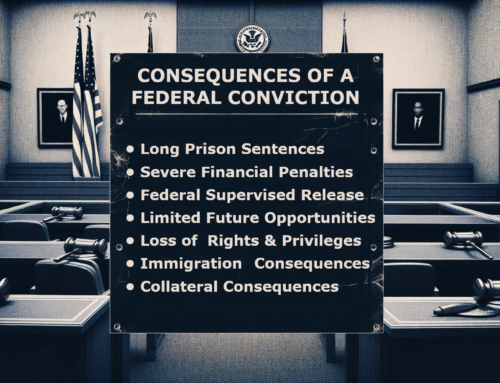Restitution in Federal Criminal Cases
What is Restitution in Federal Criminal Cases?
In federal criminal cases, restitution is Court-ordered compensation paid by a defendant to their victim for any losses or damages from the crime. The purpose is to make the victim “whole” again by restoring them financially to where they were before the crime occurred.
Why is Restitution Ordered in Federal Criminal Cases?
Criminal restitution serves a few key purposes:
- Repay victims for their tangible losses from the crime, like stolen property, damaged property, or medical bills
- Hold defendants financially accountable and require them to make amends to those they harmed
- Deter future criminal behavior by making defendants pay up
- Give victims a faster way to be repaid without needing to pursue a separate civil lawsuit
Mandatory vs. Discretionary Restitution
Whether restitution is mandatory or discretionary depends on the specific crime committed. Congress passed laws identifying certain federal offenses where judges must order restitution, known as “mandatory restitution.”
These mandatory restitution crimes include:
- Violent federal crimes
- Federal property crimes
- Fraud
- Federal drug crimes involving crack houses
- Consumer product tampering
- Theft of medical products
Who Qualifies as a Victim for Restitution Purposes?
The victim entitled to criminal restitution is the person or entity directly and proximately harmed by the crime. For property crimes, this includes the property owner or someone designated by them.
What Types of Losses are Covered by Restitution?
The losses covered by federal criminal restitution include:
- Stolen or damaged property: The replacement value or cost to repair
- Lost income and wages: Both past and future
- Medical and mental health treatment costs
- Funeral and burial costs (for homicides)
- Transportation, childcare, and other expenses related to participating in the investigation or prosecution
- Attorney’s fees for participating in the government’s investigation and prosecution
- Clean-up costs from drug manufacturing operations
The Procedure for Criminal Restitution Orders
If restitution is a possibility in your federal case, here is how it works:
- Probation Office investigates victims’ losses after conviction
- Prosecutors provide information on victims’ losses
- Victims submit claims directly to the Probation Office
- Defendant submits financial affidavit with assets, income, obligations
- Judge resolves any disputes over restitution amount
- Judge orders full restitution to all victims regardless of defendant’s finances
- Judge sets a payment schedule based on defendant’s current and future ability to pay
Enforcing Payment of Federal Criminal Restitution
The court judgment for criminal restitution is enforceable for 20 years. Even after release from prison, probation, or supervised release, the defendant remains on the hook. Here are some ways federal criminal restitution judgments are enforced:
- Wage garnishment
- Seizing assets & property
- Civil lawsuit against defendant
- Offset tax refunds & other federal payments
- Restitution as a condition of parole/supervised release; violation = reimprisonment
- Federal lien against defendant’s property
- Mandatory payment from inheritance or lawsuit settlements
Strategies for Reducing Restitution Amounts
If you are facing federal charges where restitution is possible, here are some proactive strategies I may use as your criminal defense lawyer to reduce the restitution burden:
- Negotiate restitution amounts as part of a favorable plea bargain
- Challenge the prosecutor’s evidence and estimates of victim losses
- Highlight your limited financial means and ability to pay
- Argue that the victim’s own negligence contributed to their losses
- Dispute exaggerated medical bills or claims not directly caused by the offense
- Ask the judge to offset restitution by any civil settlement amounts victims receive
- Petition the court to reduce restitution if your financial situation deteriorates









